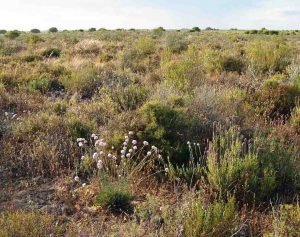
Researchers from the IRNAS-CSIC (Ignacio Pérez-Ramos and Teodoro Marañón), in collaboration with University of Córdoba, Autonomous University of Barcelona and EBD-CSIC, have studied the role of functional diversity and soil conditions as main drivers of the stability of woody plant communities in Doñana (south Spain).
The community stability has been assessed as changes in cover, species composition and diversity, in 19 experimental plots during 9 years. The functional diversity was calculated using eight traits (of leaves, stems and roots) for the 16 species comprising the different communities.
Results have proved that shrubland communities were strongly sensitive to inter-annual variability in climate. During colder and drier conditions, total plant cover decreased remarkably, but functional diversity increased; likely because of the expansion of functionally dissimilar species in the new open microsites.
The most functionally diverse communities, and those inhabiting resource-limited environments were the most stable over time in terms of species diversity. This could be explained because they were mainly constituted by a large diversity of slow-growth, stress-tolerant species that are potentially better adapted to harsh climatic conditions.
We could infer that the increased frequency of extreme climatic events (predicted by climatic models) will alter the functional structure of shrubland communities, with potential repercussions for ecosystem functioning.
This study has been published in the Journal of Ecology (on line since February 28, 2017).
Data can be consulted at the free access DRYAD repository: click here.
